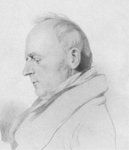
Charles Bridges, M.A. (1794 – 1869), was a preacher and theologian in the Church of England, and a leader of that denomination’s Evangelical Party. Educated at Queens’ College, Cambridge, he was ordained in 1817 and served from 1823 to 1849 as vicar of Old Newton, Suffolk.
Thomas Chalmers wrote,
‘My excellent friend, the Rev. Charles Bridges, of Old Newton, Suffolk, finds, I am sure, most ample occupation among those six hundred people whom he may be said to have domesticated into one parochial family; and, were it not for his still more important services to the Christian church at large, would show, by his incessant labours, how possible it would be to make out a most beneficial expenditure of all his strength and all his time amongst them.’
In 1849, Bridges became vicar of Weymouth, Dorset, later serving as vicar of Hinton Martell, Dorset (c. 1857). Bridges participated with J. C. Ryle in the Clerical Conference at Weston-super-Mare of 1858, and also participated in the consecration of the Bishop of Carlisle in York Minster in 1860.
At least twenty-four editions of Bridges’ Exposition of Psalm 119 (1827) were published in his lifetime. C. H. Spurgeon considered the commentary to be ‘worth its weight in gold’. Spurgeon also pronounced Bridges’ Exposition of Proverbs (1840) ‘The best work on the Proverbs’.
